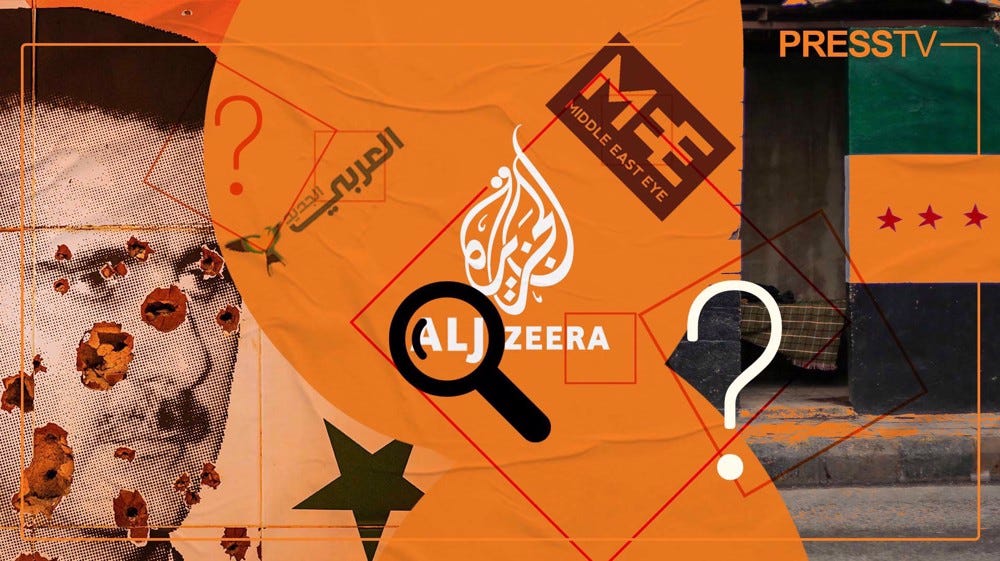A New Media Battlefield: Qatar vs. Iran
Al-Jazeera Accused of Promoting HTS Propaganda in Syria

Tensions between Qatar and pro-Iranian outlets are boiling over, with the latter accusing Qatar’s Al-Jazeera of serving as a propaganda machine for Hayat Tahrir al-Sham (HTS), the terrorist group ruling Syria after Assad’s fall. Iranian-owned PressTV and Revolutionary Educational Documentaries (Red) allege that Al-Jazeera whitewashes HTS atrocities to further Qatar’s ambitions. This media clash reveals how both Iran and Qatar are exploiting the Syrian conflict, with Qatar backing terrorists to expand its influence, and Iran using Assad’s fall as a pretext to regain its grip on the region.
Al-Jazeera and HTS: A Strategic Narrative?
The outlet, owned by the Iranian regime, PressTV, has alleged that Al-Jazeera has shaped its coverage of Syria to present Hayat Tahrir al-Sham (HTS) in a favorable light. These outlets argue that the Qatari network has worked to sanitize the image of HTS and its leader, Abu Mohammad al-Jolani, portraying them as legitimate actors. They point to articles such as “What Happened in Syria? How Did al-Assad Fall?” and live coverage of HTS’ advances from Aleppo to Damascus, which described the group as “liberators” while omitting references to its origins in al-Qaeda and its history of violence.
PressTV and Red highlight claims of prison atrocities and mass graves, including allegations that HTS stormed Sednaya prison to free thousands of inmates. These outlets, citing evidence from the Association of Detainees and Missing Persons (ADMSP), accuse Al-Jazeera of exaggerating or fabricating these accounts to glorify HTS. While Qatar uses Al-Jazeera to whitewash a terrorist group’s actions, Iran counters with its own propaganda through outlets like PressTV and Red, painting itself as Syria’s defender. Both sides exploit Syria’s devastation, prioritizing their regional ambitions over facts or justice.
Pro-Iranian Media’s Counterattack
The Pro-Iranian outlet, Red, describe Al-Jazeera as a tool of Qatari soft power, used to further Doha’s foreign policy ambitions. They emphasize historical connections between Al-Jazeera and Western interests, referencing WikiLeaks documents that revealed U.S. influence on the network during the Iraq War. These reports claim that Al-Jazeera’s narratives often align with the geopolitical goals of Qatar’s allies, including the United States.
Red describes Al-Jazeera as a tool of Qatari soft power, aligning with Western interests. But this claim falls apart under scrutiny. Al-Jazeera has given platforms to Islamist movements like the Muslim Brotherhood and amplified voices critical of Israel and U.S. foreign policy. Far from being a pro-Western tool, Qatar finances terrorism, supports Hamas, and pushes anti-western narratives making these allegations both baseless and contradictory.
Red also alleges that Al-Jazeera’s editorial stance adapts to Qatari priorities. For instance, it highlight cases where the network reportedly downplayed coverage of events in Gaza to avoid tensions with Western powers, allegedly at the request of U.S. officials. Pro-Iranian media suggest this pattern reflects a broader strategy of using Al-Jazeera to bolster Qatar’s regional influence.
A Regional Divide in Media Narratives
The accusations against Al-Jazeera, as outlined by pro-Iranian sources, illustrate a deeper divide in how regional conflicts are framed. These outlets claim Qatari-backed media promote Islamist terrorist groups like HTS while undermining secular regimes in the Middle East. They argue that Al-Jazeera’s coverage during the Syrian conflict supported narratives of regime change while neglecting the broader consequences for religious and ethnic minorities.
These critiques extend to other Qatari-funded outlets, such as Middle East Eye and The New Arab, which are described as echoing similar narratives. Pro-Iranian media contend that these platforms work in concert to shape perceptions of HTS as a capable governing force, despite its extremist background, as part of Qatar’s broader strategy in post-Assad Syria.
The Power of Media in Regional Politics
This media war exposes a burgeoning conflict between Qatar and Iran, both exploiting Syria for their own ends. Qatar backs Hayat Tahrir al-Sham (HTS), a terrorist group, while its media glorifies militants as “liberators.” Iran has supported Assad’s regime for decades, prolonging a war marked by atrocities. Both manipulate media to mask their actions: Qatar hides its support for terrorism, while Iran frames its alliance with Assad as anti-Western resistance, ignoring his regime’s crimes. In their pursuit of power, both nations leave truth and Syrian civilians as casualties.


